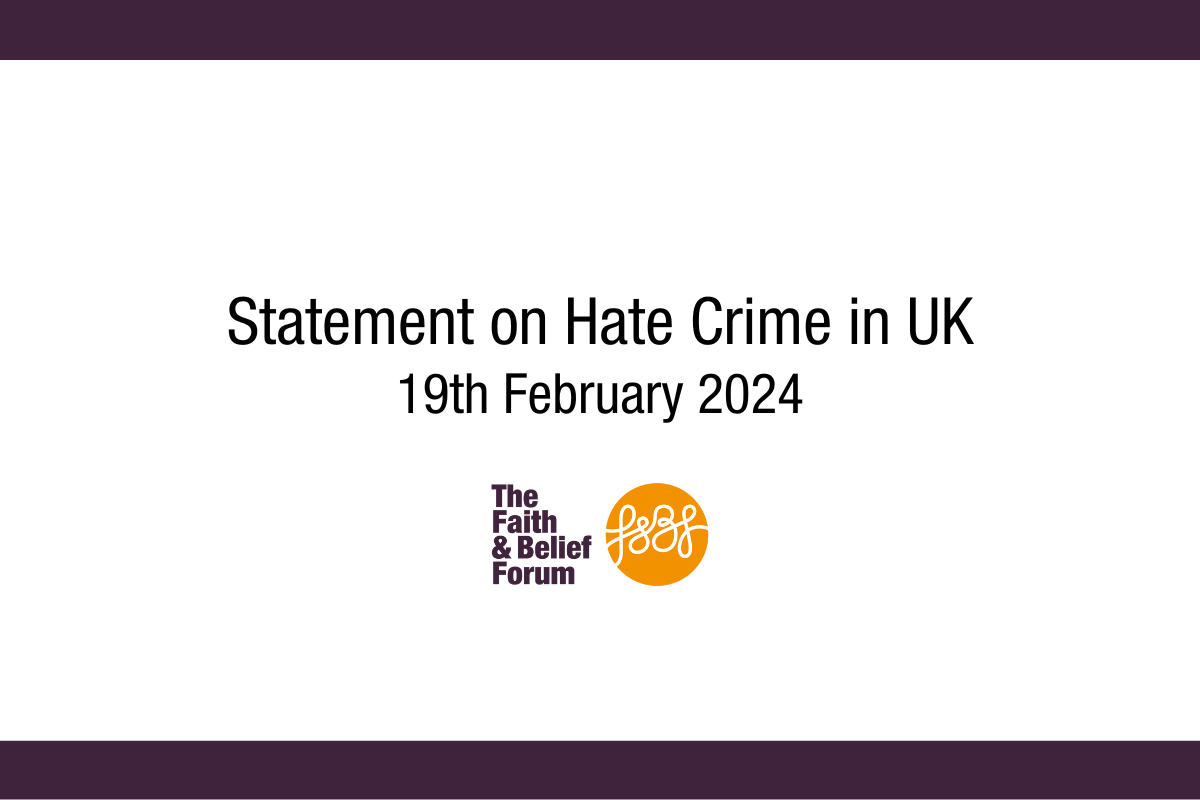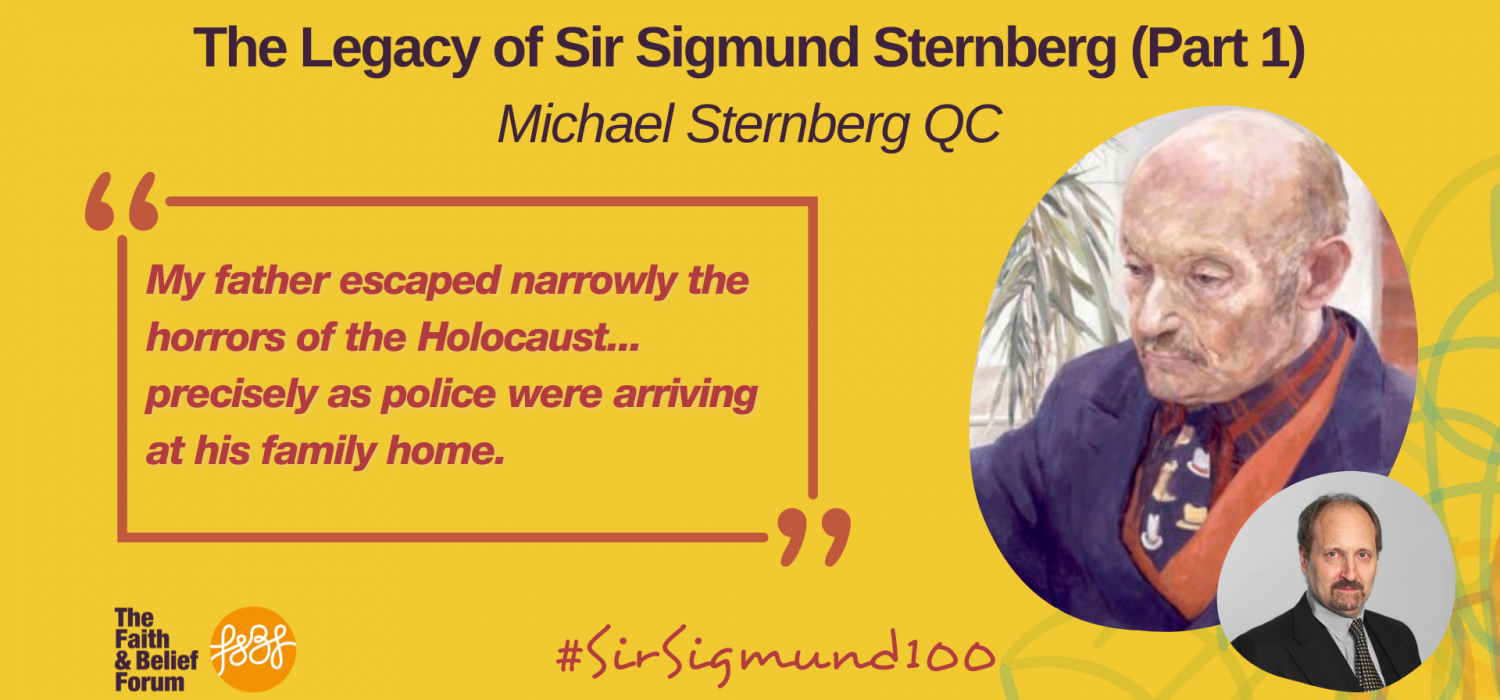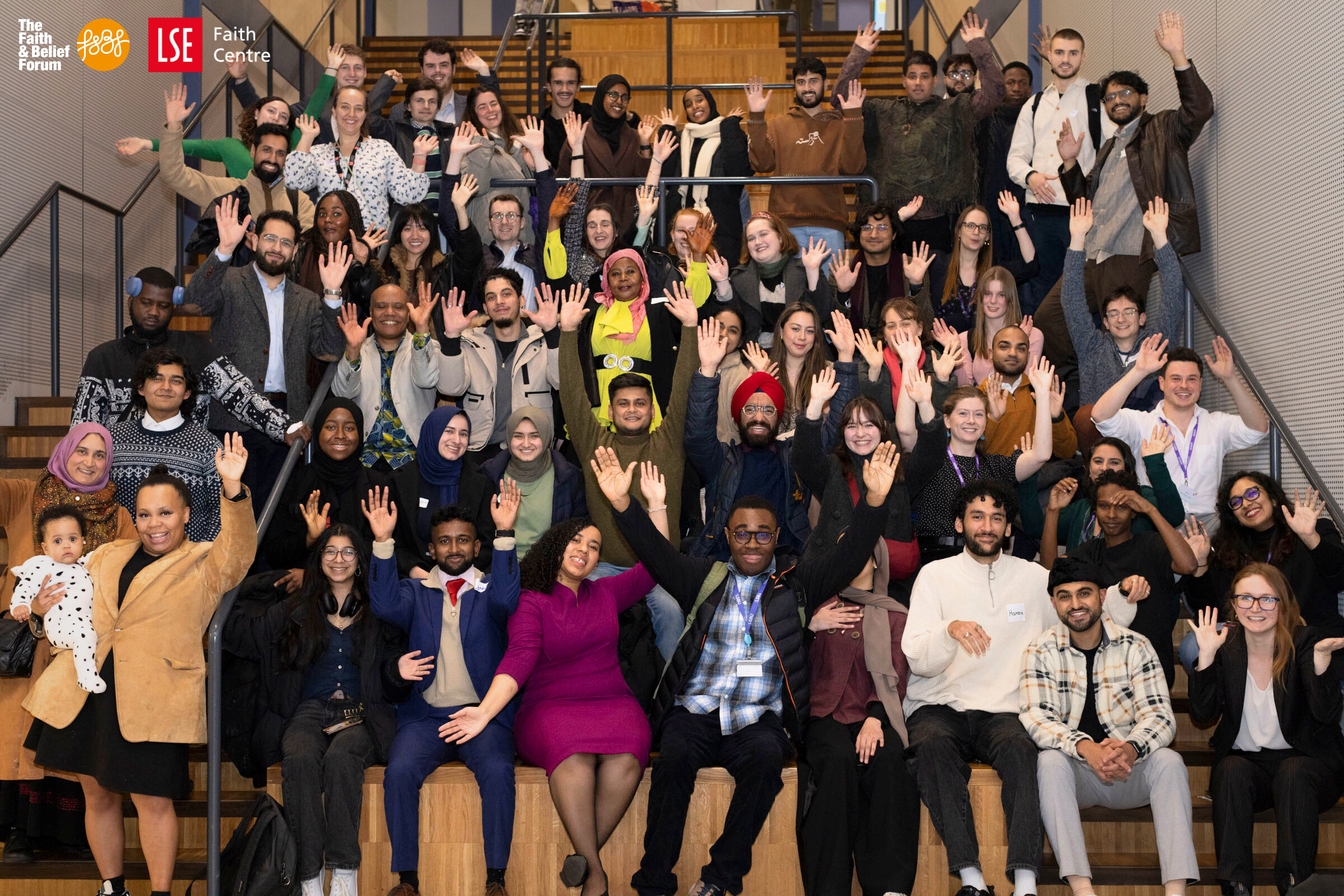
Statement on Hate Crime in UK – 19th February 2024
19 / 02 / 24
Menu

21 / 06 / 21

Michael Sternberg QC, son of F&BF co-founder Sir Sigmund Sternberg and Chair of Trustees, shares his memories of his father’s legacy from humble beginnings to pioneering interfaith dialogue in the UK and beyond.
This month we are commemorating Sir Sigmund’s 100th birthday.
Growing up in the 1950s in a home in Hendon with my father as the head of the household was unforgettable. He was a most unusual man who never allowed difficulties or obstacles to thwart him. If he could not surmount them, he found a way round them. He gave no concession to personal self-indulgence and exhibited iron self-discipline.
He took his health extremely seriously leading a well ordered life which began with physical exercises every morning, a very careful and balanced consumption of food and water and learning relaxation techniques which he used to good effect. Initially a heavy smoker of cigarettes at the first news that this caused lung cancer he switched to cigars and then when later it became apparent that these caused a danger of mouth cancer, he stopped smoking altogether.
He never once as I recall as a child had a cold. He always went into his office whatever the weather and whatever the circumstances. On the other hand, he was very sympathetic when we as children were physically sick, and he went out of his way to look after us when this happened.
It was these qualities which helped him to attain what with hindsight was a phenomenal and extraordinary series of achievements in ways which were they in a novel would be regarded as incredible.
Born in Budapest, Hungary on 2 June 1921 to a Jewish family, my father escaped narrowly the horrors of the Holocaust and settled in Britain in 1939 by leaving Budapest by train on the last weekend of peace in August at the urgings of his mother, precisely at the very moment the Hungarian transport police were arriving at his family home with a warrant for his conscription (which would have almost certainly meant death sooner or later). Initially he had refused to go because Shabbat was coming in, so my grandmother dragged him in front of a senior rabbi in Budapest, who told him that whatever the laws of Shabbat might be, if his mother said he had to leave he had to leave; also, that he need not worry about any divine displeasure. So, my father carried his bag to the station and got on a train.
The story of his escape carries echoes of the film Casablanca. When the Hungarian Transport Police demanded menacingly where he was, my late grandmother who was a very smart lady, replied at once that he was with his girlfriend and that she knew they would be having fun somewhere. She would not see him until the Monday. It was of course a complete lie. But the police being what used to be described in those days as Men of The World accepted this and by Monday my father was safely arrived in London. He carried with him a passport with a stamp saying that he was not allowed to work and with the sum of £10 in his wallet and no more. From such challenging beginnings arose the great business empire which was created and the rewards of which were later funnelled into interfaith work
He was a hugely unusual high-achieving man who could never be still for a moment and who right up until his death in 2016 was full of incessant bubbling ideas of how to improve a lot of minorities and remove religious discrimination. He was as demanding of his children as he was of those who paved the way for him to create his great achievements, which were numerous and unique.
His early experiences of being bullied at school (because “You killed Christ”) and his curiosity about why he was forbidden from going into Budapest’s churches and its cathedral, also the lack of dialogue as he saw it between Roman Catholics and Jews in his native Hungary would leave a profound impression on my father. Today F&BF runs school workshops and linking sessions to educate young people of all backgrounds about their neighbours.
He also had a wry sense of humour. It is said he greeted Pope John at the first visit of a Pontiff to a synagogue in Rome, which he had a major hand in creating, after the customary formalities with the words “What kept you?” He passionately believed in the importance of dialogue backed up with actions. He foresaw in the mid-1990s the desperate need to improve relations between Jews and Muslims which strange to say few at the time did.
As a young person in the 1930s having heard Hitler’s rants over the radio he understood the continuing and ever present need to work to fight discrimination and religious hatred. But he had other accomplishments. He was mediocre golfer an accomplished horseman and a young man who had learned how to shoot with unerring accuracy. He tried unceasingly to get rid of his thick Hungarian accent but in the end, it came back very heavily. He learned at my late mother’s urgings to like the plays of Shakespeare. His favourite was King Lear which he saw as a terrible example of a failure to communicate leading to complete tragedy.
His categorization in wartime England was as A friendly enemy alien. Prevented from joining the RAF, as part of the Civil Defence Corps he spent the blitz on the top of buildings in Regent Street in extreme danger, signaling to the fire brigades where incendiary bombs were falling. He never once took cover in an air raid shelter during the war. He told me he was quite convinced he was going to survive it pretty much whatever happened, and he was right.
___
Michael is Chair of the Board of the Trustees of Faith & Belief Forum; he was previously Chair of 3FF from 2009. He was educated at Jewish schools and then at Cambridge University, where he obtained degrees in English and Law. He was called to the Bar in 1975 practising as a Barrister specialising in family law. He became a QC in 2008. Michael has been active in interfaith work for over 30 years. Michael was awarded the Cross of the Order of Merit of the Federal Republic of Germany in 2019, in recognition of his contribution to interfaith work. Michael is a member of the United Synagogue and the Liberal Jewish Synagogue.

19 / 02 / 24

16 / 02 / 24

16 / 02 / 24